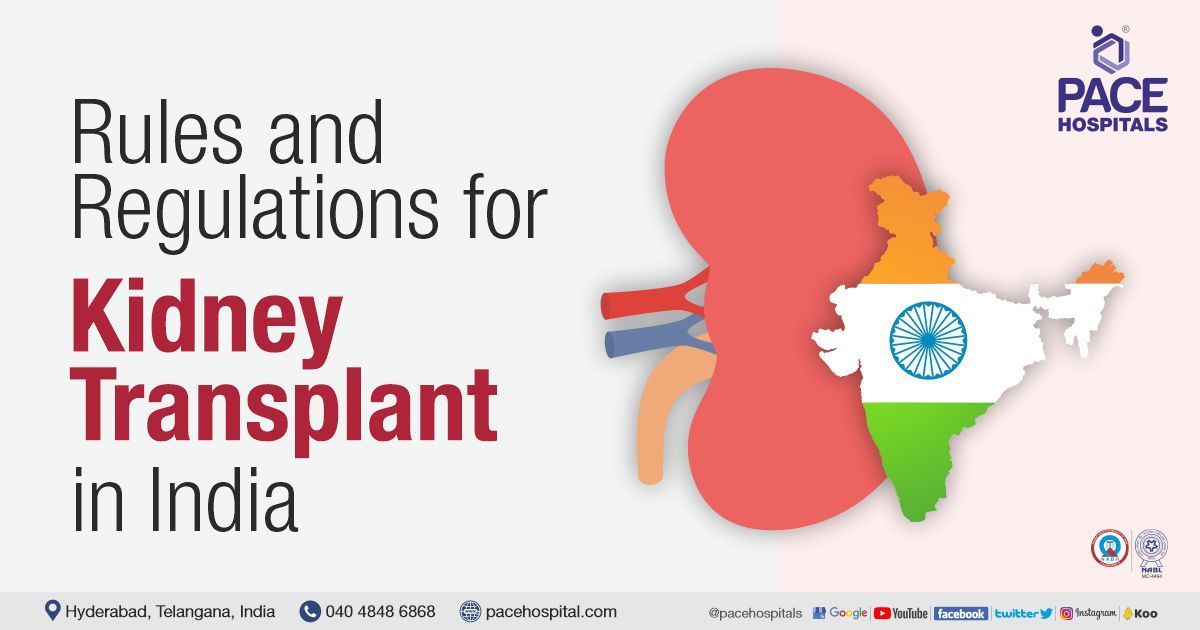Rules and Regulations for Kidney Transplant in India
PACE Hospitals
Kidney transplantation in India is done under the rules and regulations laid by the Govt. of India. These rules and regulations are mainly to avoid illegal selling of organs for monetary benefit and to regulate the removal, storage and transplantation of organs for treatment purpose.
The first act passed in 1994 was called Transplantation of Human Organs Act (THOA). Later the act was modified in 1995, 2008, 2011 and 2014. Ministry of health and family welfare in 2014 notified the Transplantation of Human Organs and Tissue Rules which is currently followed in the whole country.
Based on the source of donor organ, kidney transplant is classified as living donor transplantation or cadaveric (deceased-donor) transplantation.
Living donor transplantation
Any living person willing to donate his kidney should be in proper state of health and should not be mentally challenged. He should be fit to donate the kidney. If there is any doubt regarding the mental status of the living donor, then he needs to be evaluated by a psychiatrist.
Types of living donors
Living kidney donors can be any one of the following:
- Near related donor (includes brother, sister, mother, father, son, daughter, grandmother, grandfather, grandson and granddaughter)
- Spousal donor
- Donor other than near relative
In case of near related donor and spousal donor, the competent authority of the hospital where transplant will be conducted grants approval. Rigorous scrutiny of documents (birth certificates, marriage certificates, marriage photographs, AADHAR, voter ID, Ration card) of relationship will be done and genetic tests are conducted if relationship is not conclusively established in case of near relatives.
Donor other than near relative can be a person who is a relative of recipient (other than near relative), neighbour, friend etc. who is emotionally attached to the patient and want to donate without any monetary benefit. Approval for such donors will be done by authorisation committee (which can be at hospital, district or state level).
In Telangana state level, authorisation committee grants approval for such donor recipient pairs. Authorisation committee will scrutinize in all the possible ways to ensure there is no financial transaction or illegal transplant in such cases. Authorisation committee will also grant approval for foreign national donor-recipient pair and swap donations.
Foreign nationals (donor and recipient) can be transplanted in India after getting permission from the respective country embassy or government and authorisation committee. Foreign nationals cannot receive a donation from an Indian national unless they are near relatives. Donation from minors is usually not permitted.
Cadaveric (deceased-donor) transplantation
Deceased donors (cadaveric donors) are people who are declared brain-dead by a team of experts. Organs from such donors are taken after the consent of immediate relatives for transplantation. Cadaveric donation in the state of Telangana is done under the prestigious and robust Jeevandan programme.
- Patients with end stage kidney disease (ESKD) on dialysis for deceased donor transplant should register themselves in the hospital (transplant centre) recognised by Jeevandan
- Affidavit should be submitted for non-availability of living donor (genetically or emotionally related)
- Patient can register in only one transplant centre
- Each hospital (transplant centre) has its own recipient list who are enrolled for deceased donor transplant and regularly updated
- After registration, patient will be placed on waiting list of transplant database of all the transplant centres maintained by Jeevandan
- Allocation is done based on blood group and score of individual patients based on multiple factors
- Blood group matching is preferred (Example: Blood group O donor organ is given to Blood group O recipient and likewise for B, A and AB blood groups)
- If there is no Blood group O matched recipient then it can be allotted to other blood groups in the order of B, A and AB.
- AB blood group recipient should receive from AB donor only. In some situations when other blood group donor (O, B, A) is available and no recipient is available to take the kidney then such kidney can be given to AB
- Scoring of individual patients is done on multiple factors like:
- Age
- Age difference between donor and recipient
- Time on waiting list
- Vascular access problems
- Previous graft failure etc.,
- If a deceased donor is available in a private hospital, then one of the 2 kidneys will be allocated to the same hospital and transplanted according to the priority list of that institution
- Other kidney will be given to general pool of all government and private hospitals combined in the state.
Share on
Request an appointment
Fill in the appointment form or call us instantly to book a confirmed appointment with our super specialist at 04048486868
Appointment request - health articles
Recent Articles











